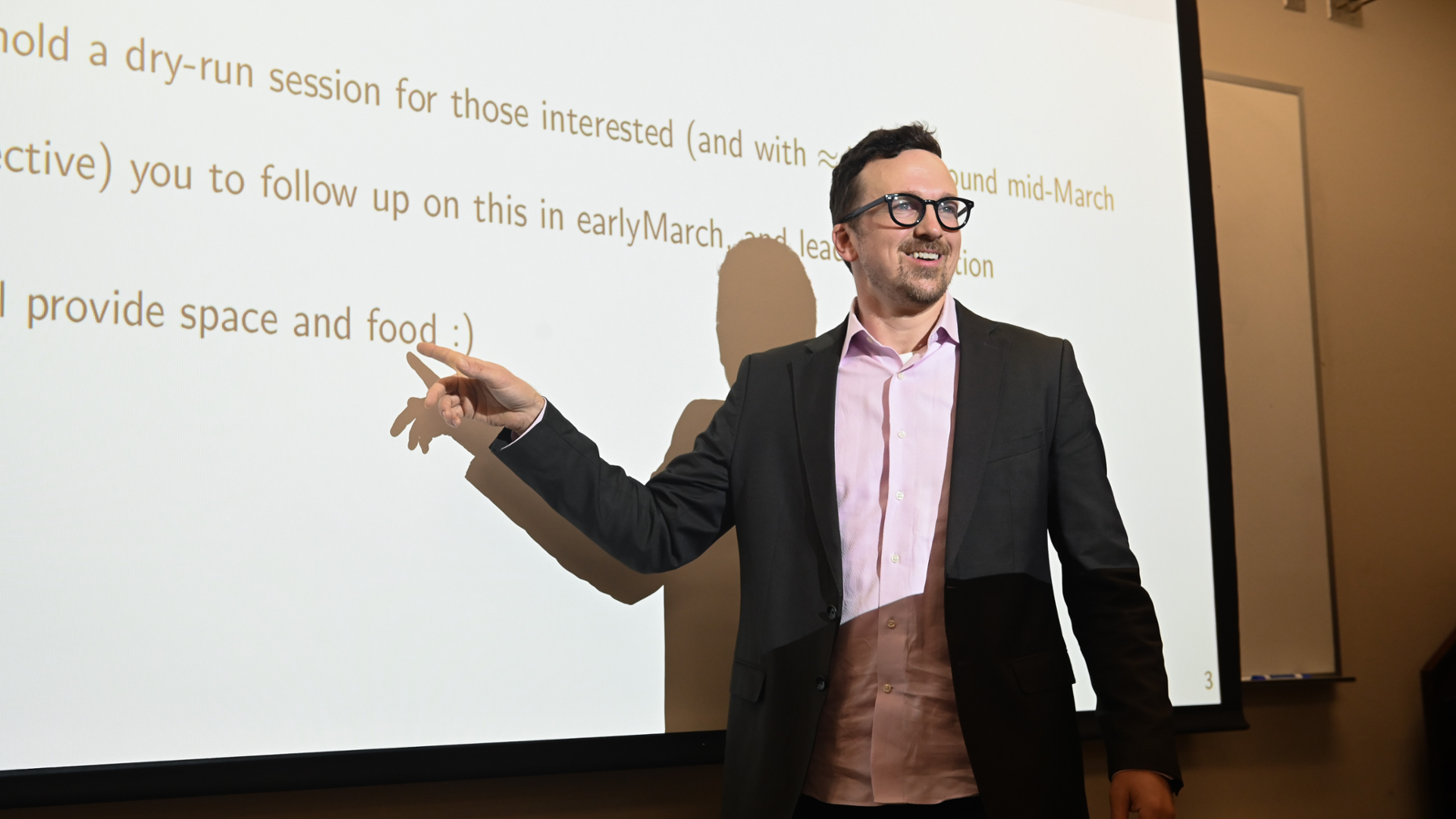
Honors Program
The Honors Program in the Department of Economics seeks to identify those students who have distinguished themselves academically in the initial years of their study and who wish to further their pursuit of intellectual dialogue through the opportunity to learn the craft of original research in the field of Economics, ostensibly leading to the application and/or study of Economics in the future.
Administered by the Emory College Honors Committee, the Honors Program in the Department of Economics allows especially qualified Economics and joint Econ-Math majors to engage in research and coursework more advanced than the normal undergraduate program, with commensurate standards for performance.
Watch this video to learn more about the Honors Program:
Starting in 2019 (Emory College Class of 2020), students who have completed all of the minimum requirements for consideration will be allowed to submit application materials in February of their junior year. The specific minimum requirements are:
- An overall GPA of at least 3.7 and no pending "incomplete" courses as of January 31.
- Completion of Econ 201, 212, and 220 (or MATH 361 in place of 220).
- Completion of Econ 320, 421, 422, or 423, with an A or A- grade (conditional decisions may be extended for those taking these courses at the time of application).
- A graduation date of the following Spring.
Students who obtain agreement from an eligible faculty member to serve as their advisor for the honors thesis year by the time of application will be given priority admission. In such cases, please include with your application the confirmation email from the faculty member that indicates such.
In rare circumstances, requests for exceptions to the criteria above may be made by an applicant in an additional paragraph in the application essay. Exception requests must be accompanied with an indication of an ECON faculty member who prospectively agreed to serve as the applicant's primary advisor the following year. For example, a class of 2022 applicant may not have been able to take ECON 320 by the spring of their junior year. That student should proactively seek out a faculty member to agree to their thesis advisor in 2021-2022 by the time they apply for the Honors Program in Spring 2021. Prospective applicants should not contact the Honors Coordinator nor the Undergraduate Program Director or Coordinator to ask for or discuss exceptions or allowances.
Students interested in participating in the Econ Honors Program should plan accordingly. Starting with the Honors class of 2020-2021 (Emory College Class of 2021), strong preference will be given to those who have had exposure to research in the social sciences prior to entering the Honors program.
This could be achieved within Emory via programs and opportunities such as, but not limited to, CLSS, SURE, SIRE/RPP, Mellon Mays, as a research assistant in any social science, or by taking a Directed Reading (Econ 397R) or Research Lab (ECON 499/R) course.
This could also be achieved outside of Emory via opportunities such as, but not limited to, summer programs like:
- The American Economics Association Summer Training Program,
- PPIA Junior Summer Institutes (JSI),
- BFI Summer Research Experience for Undergraduates,
- CIC SROP,
- or paid summer Research Assistantships/research-based internships to faculty at a university or in a research organization.
Applications will be blind-reviewed. Applicants should use only their Emory ID number on their application documents in lieu of their name. Any revelation of the applicant's name in the application documents will disqualify the application.
The ID number will be used for verification of having met the minimum application requirements only after applicants are preliminarily selected for admission to the Honors Program.
All materials are to be submitted online. Click here for the submission link.
Submit the following documents:
- A questionnaire/application form.
- A research proposal of 1-2 pages. The student should discuss a research topic or question they might develop into a thesis. The statement also should explain why the student is interested in doing research on the topic, related coursework, and (optionally) what faculty member or members the student would like to work with in carrying out the project. The proposal will be assessed in terms of: 1) Demonstrating the ability to formulate and motivate a meaningful research question in Economics; 2) Specifying methods that could be used to answer the question; and 3) The likelihood that the applicant who prepared the essay could likely write a successful Honors Thesis.
- A sample of academic writing from an Economics or other Social Science course that best demonstrates the student's ability to write an in-depth original paper.
The Economics Honors Program Coordinator, in collaboration with the faculty of the Economics Department, will review these materials and select the participants for the Honors Program.
In addition to these materials, the faculty will also take into consideration the applicant's overall GPA, major GPA, and coursework in Economics, especially upper-level ECON courses taken at Emory or at Oxford College prior to the Spring semester of the student's junior year.
Only students who submit materials will be considered. Accepted students will be required to attend an orientation session and meet with a potential thesis advisor prior to the end of the Spring semester in which they applied and will be expected to complete prepatory coursework and substantial readings over the summer prior to their senior year.
Based on feedback from Honors Coordinators, the Honors Committee recently decided to open up the GPA petition schedule so that students can petition for admittance to the Honors Program in May or at the usual time in August. We realize that an earlier petition option will help students who need the summer to begin their research and plan for their final year.
Early petitions will be reviewed after spring grades are posted. This means that Honors Committee members will be meeting in the summer, so we ask that petitions are sent to ec.honorsprogram@emory.edu by May 15. This might require students to begin preparing their petitions and acquiring support letters before grades are posted.
All students who want to petition for admittance to the Honors Program must have at least a 3.65 cumulative GPA (including grades of courses taken from ANY school at Emory). Students admitted by petition are required to earn a 3.7 GPA per semester until graduation, instead of the cumulative 3.7 needed for students admitted without petition. Note that this petition minimum is a departmental requirement.
Students granted a GPA waiver in May will be required to maintain a 3.65 GPA throughout the summer. If their GPA drops below the minimum after summer grades are posted, they will no longer be eligible to participate in the Honors Program.
We hope this will provide some flexibility for your students as they are making plans for their final year at Emory.
May petitions are due on May 15, and August petitions are due on August 10. For a complete petition, the following documents are needed:
- A detailed letter written by the student outlining why they should be admitted, the kind of work/research they want to do, why their GPA is lower than 7, and any other pertinent information (including extenuating circumstances).
- A strong letter of support from the student's potential thesis advisor
- A strong letter of support from the student's faculty honors coordinator or department chair.
- The Honors Program Administrator will pull a copy of the student’s transcript directly from OPUS so there is no need to submit this.
The Economics Honors Program operates on the basis that the level of instruction and workload exceeds that of the typical undergraduate courses, thus requiring the dedication, self-motivation, and time investment typical of a graduate-level course in Economics or a related field.
Students should plan to register for the 4 credit hour Honors Sequence in each of the Fall and Spring semesters (total of 8 credit hours).
Students should expect to spend a minimum of 2-3 hours per weekday throughout the academic year undertaking class readings, preparing paper critique/discussion presentations, and identifying a research question and the appropriate methods and data to approach the topic, and writing the thesis paper.
In addition to scheduled class sessions, students are expected to meet with the Honors Program Coordinator approximately monthly on a one-on-one basis in the Fall and will meet with a primary advisor on a weekly basis in both the Fall and Spring.
At the end of the senior year, an examination covering the honors work is given to complete the program and bestow Honors upon the graduating Senior. One examiner must be chosen from outside the department.
Joint majors pursing a degree in Econ-Math, Econ-Human Heath, or Econ-Computer Science may complete Honors in the joint major by completing the requirements for Honors in one of the joint major departments. Students must choose a primary "hosting" department for their joint-major Honors Thesis and follow the procedure/requirements for admittance into the hosting major's Honors Program. Participation in the Honors Program in more than one department is forbidden by the College. For joint majors, the student's primary advisor must be from the hosting department, and the student's Honors Thesis Committee must include one faculty member from the other joint major department, and one faculty member from a department other than the Economics or the Mathematics Department.
